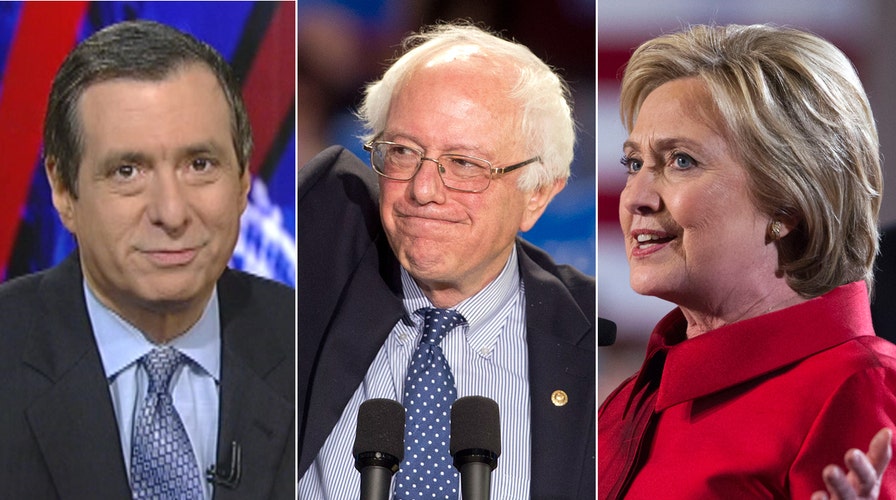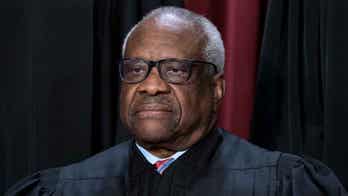Kurtz: Why the press soured on Sanders
'MediaBuzz' host reacts to positive press for Hillary Clinton, not so much for Bernie Sanders
The Inevitable Hillary Clinton has returned.
The media have spoken and again bestowed the cloak of inevitability on the Democratic front-runner.
One five-point win over Bernie Sanders in the Nevada caucuses was all it took. In other words, the Democratic race was fun while it lasted.
You might think the pundits would be allergic to the I-word. After all, they first described Hillary that way in 2007, and yet she lost.
Then they described Hillary that way in 2015, and she plummeted in the polls, finished a few coin flips ahead of Bernie in Iowa and got decimated in New Hampshire.
But here it is in Slate: “Winning Nevada makes Hillary Clinton’s nomination virtually inevitable.”
Or as the Huffington Post’s banner headline put it: “BERNING OUT?”
Here’s the deal: Clinton’s campaign said all along that her strength with black voters would swamp Sanders once they got past the first two mostly white states. That happened in Nevada over the weekend, and will likely happen this week in South Carolina, which has a large African-American population. So as long as Hillary doesn’t lose the FBI primary, the media’s verdict is that the Sanders surge is over.
You can see one outlet after another jumping off the Bernie bandwagon:
“His path to the Democratic nomination, already steep, has narrowed considerably now that Clinton has re-established herself as the all-but-prohibitive front-runner,” says the Washington Post.
The New York Times does the math:
“The often overlooked delegate count in the Democratic primary shows Mr. Sanders slipping significantly behind Hillary Clinton in the race for the nomination, and the odds of his overtaking her growing increasingly remote. Mrs. Clinton has 502 delegates to Mr. Sanders’s 70; 2,383 are needed to win the nomination.”
The aforementioned Slate piece:
“By winning, Team Clinton doesn’t just score delegates—it proves its theory of the race. The Clinton campaign believes that Sanders’ strength and enthusiasm is illusory; that it reflects the peculiar demographics of Iowa and New Hampshire—rural states with few minorities—more than any pro-Bernie tide in the Democratic Party. Nevada, in other words, was a test. If Clinton lost, then it presaged a tighter race in South Carolina and beyond, and possibly one that ended with a Sanders nomination. Now, instead, we have a race that essentially looks like it did in the beginning of the year.”
And Politico says Sanders’ young voters may be unreliable:
“More than a half million college students from 14 states will be on spring break at the same time that the presidential campaign train chugs onto their campuses, according to a POLITICO analysis of the March 5 to March 26 primary and caucus states.
“For Sanders to keep his momentum into April, he’s going to need to turn the #FeeltheBern college crowd’s enthusiasm into real live votes. But that’s a lot harder to do when those students have fanned out far away from their classrooms and are binge-watching Netflix on their parents’ couches or partying in New Orleans rather than caucusing in Bangor.”
To be sure, Sanders has done far better in this campaign than anyone, including me, imagined. Even his narrow loss in Nevada was a comeback from a 25-point deficit. The 74-year-old senator has fired up the liberal grass roots, exposed serious weaknesses in Clinton’s candidacy and pushed her to the left.
But I’ve been arguing that the media never truly took Sanders seriously as a plausible nominee. If they had, they would be doing a much more thorough vetting of his policies, his background and his record.
Case in point: this piece by Paul Krugman, the liberal New York Times columnist and Nobel Prize-winning economist. What he writes about was barely a story, but would have been huge if Sanders was viewed as a major-league contender. In fact, the press would have gotten there first:
“Four former Democratic chairmen and chairwomen of the president’s Council of Economic Advisers — three who served under Barack Obama, one who served under Bill Clinton — released a stinging open letter to Bernie Sanders and Gerald Friedman, a University of Massachusetts professor who has been a major source of the Sanders campaign’s numbers. The economists called out the campaign for citing ‘extreme claims’ by Mr. Friedman that ‘exceed even the most grandiose predictions by Republicans’ and could ‘undermine the credibility of the progressive economic agenda.’”…
“Mr. Friedman outdoes the G.O.P. by claiming that the Sanders plan would produce 5.3 percent growth a year over the next decade…Sorry, but there’s just no way to justify this stuff. For wonks like me, it is, frankly, horrifying.”
But you don’t have to be a wonk to know that a 5.3 percent growth rate is wildly unrealistic.
Maybe the political pundits are wrong. Maybe Sanders will figure out how to make inroads in the minority community and Clinton will lose traction. But after so much early chatter about a Hillary coronation, the media are right back where they started.





